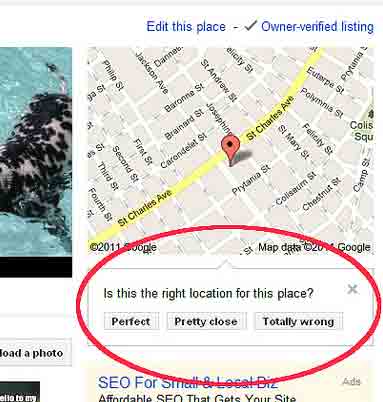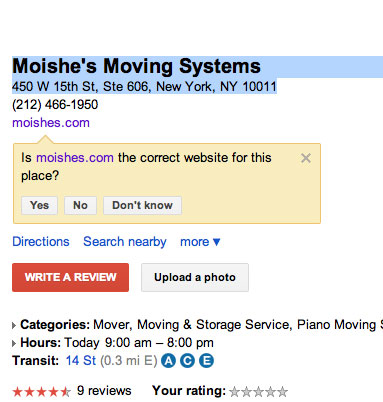Understanding Google My Business & Local Search
Google Places Adds a Range of New UGC Features
Over the past week or so a number of new features have cropped up Places Pages that solicit user input in an effort to improve the quality of Places results. Google noted that “We’re doing different experiments like that on Maps to verify data is correct and up to date”.
| Ability to critique the location accuracy was spotted by Daniel Hollerung and reported by Chris Silver Smith. |  |
| The ability to vote an owner uploaded photo up or down was noted by Gav Heppinstall last week. |  |
| The option for a user to provide input as to whether a website is correct regardless of whether of the record has been claimed was first seen late last week and reported out by Matt Siltala yesterday. |  |
With the exception of the image vote, these new user inputs appear to surface on a somewhat random basis and although they could be related to trust issues, I don’t think they are. Another point of interest is that with the multiple choice answers, the user is given a range of choices that go from positive to negative. It appears that the method in which they are implemented attempts to minimize the ability to game them by evil doers.
Clearly, user generated input has in the past been used to abuse listings in Places and there are plenty of other ways that could be used to triangulate a record’s accuracy via 3rd party sources. Even though it appears that Google has recently upped the ante on that front the question remains as to why Google is again increasing the ability of users to provide input when many recent efforts have gone so wrong. Chris Silver Smith points out that Google has never really prioritized the business owner as the definite source for information.
Google’s comments not withstanding, these new inputs do not appear to be experiments (unless of course you consider Places a big experiment). It does seem to be a renewed effort by Google to gather more user generated input as to the accuracy around a Place.
In theory, despite past abuses, user generated input is cheap and potentially valuable source of current information. The question with these new implementations is whether Google has put in place reasonable safeguards and adequate processes to actually improve the overall quality of the index WITHOUT punishing innocent businesses. Time will tell.
© Copyright 2026 - MIKE BLUMENTHAL, ALL RIGHT RESERVED.



Comments
7 Comments
Hi Mike, thanks for the mention!
I also noticed the map location pointer just the other day and i did wonder if it was a new development. My guess is that when a certain amount of users vote a location as “totally wrong”, then it may trigger a review.
Looking at this from the other point of view, im curious as to wether Google accounts would accrue “authority” the more data they supply which seems to validate other votes or agree with the majority. And then subsequently, a more authorative user have more klout and influence on a Places Ranking when writing reviews etc……all speculative but probably common sense at the end of the day.
It is not clear whether these changes or inputs accrue to a user. Certainly location issues via the “Report a problem” accrue to a users profile in MapMaker so it is not unlikely that they do have a trust ranking associated with the user.
The changes are interesting, but I have a different suggestion Google could implement…in my dreams…to make sure their index is accurate. Remove all but claimed listings from the index, and then view the owner of the claimed listings as the authority on their business data. Communicate directly with them. It seems like a no-brainer really, that Google has approached backwards from the get-go.
I don’t see business data as being appropriate for these open source/social treatments and I never have. Reviews, yes…but business title, address, phone number, web address, categories and details…no.
[…] Kuiper just pointed out to me, that in addition to the random UGC discussed this morning, that full on community edits of a claimed listing have returned to Places. […]
Hi Mike, thanks for the great analysis, as always.
Two thoughts/open-ended questions:
I wonder what kind of positive effects user input might have on rankings, if any. If great enough numbers of people say that some of the most basic info about a particular business (website and location) is accurate, it would stand to reason that that business might get a little boost in rankings. I guess we’ll see, but I can’t help but wonder even at this stage.
It seems to me that Google will only take this further, and eventually start asking visitors whether the phone number is correct, and (maybe, just maybe) whether the business name is accurate. As you said, these don’t seem to be experiments, so users’ feedback on phone numbers seems a logical next step by Google.
@Phil
On point one, my sense is that trust and trust in the data accuracy are independent of increased ranking.
If these inputs have an affect on ranking it is more likely to work the other way where an untrusted record is pushed out of the results.
I am sure that you saw my subsequent post… Google is now allowing users to edit every aspect of a claimed business.
[…] Google Places (Maps & Local) – Mike – 6:00 am Two weeks ago there were numerous reports of new pop-ups on the Places page to ascertain from visitors the accuracy of a business location, […]
Comments for this post are closed.